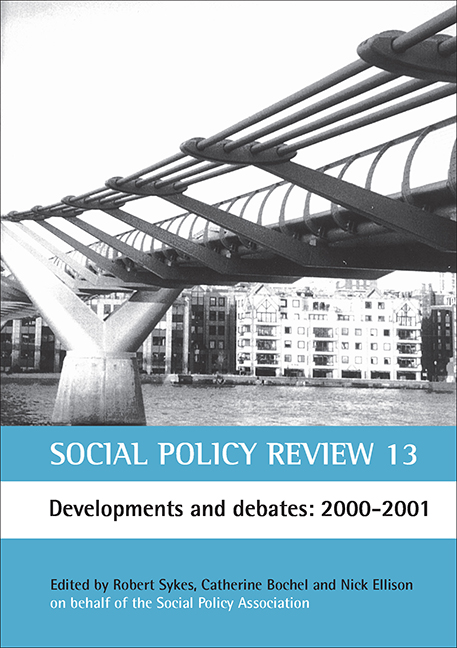eleven - Dis/counting the future
Published online by Cambridge University Press: 20 January 2022
Summary
Introduction
Social policy has always had a stronger sense of the past than of the future. Systems of social insurance were meant to pool collective risks across time, with contributions appending the present to the past as a shelter against the uncertainties of the future. So even though the insurance principle is an actuarial fiction it established a de facto intergenerational contract. Even at its best, however, this contract extends across no more than two generations – a time horizon of about 50 years, too short for the challenges that we now face – and the rising inequalities of the last 20 years have placed social insurance under strain (Thomson, 1992). Why have social insurance systems when people are less willing to pay contributions to help insignificant others? Surely the affluent can pay for themselves and the poorest helped with various forms of means-tested provision! This is not to claim that social insurance is dying but neither can it be claimed that social insurance has been central to the socio-economic reforms of the last 20 years.
What this means is that an orientation to the known past is replaced by an orientation to a future that appears inherently unknowable. Therefore, the present takes on a vertiginous quality and the future seems always to fall away from us even as we tumble towards it with ever-greater velocity. And as time becomes a source of psychosis, a temporal anomie, so politicians and policy-makers reach for the pragmatic, the safe, the predictable. The new social democracy is merely that which demands that we streamline our descent for the sake of efficiency. Yet the more we apply a post-ideological managerialism to social reform, subjecting the present to a perpetual audit, the faster the rabbit-hole seals behind us.
So if social insurance systems lack a proper sense of the future, and if contemporary policy reforms treat the past as a sacrificial resource, can we devise a new temporal narrative (Kim and Dator, 1999)? Are we still capable of mirroring the shadows of the many possible futures that are cast upon the present through acts of collective imagination, or has this political imagination been lost forever? This chapter attempts to answer this question with reference to two of the greatest challenges we now face.
- Type
- Chapter
- Information
- Social Policy Review 13Developments and Debates: 2000–2001, pp. 227 - 246Publisher: Bristol University PressPrint publication year: 2001



